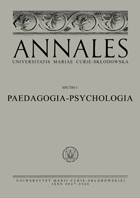Aspects of Educating Future Specialists in the Food Industry Amid Changing Social Realities
Aspects of Educating Future Specialists in the Food Industry Amid Changing Social Realities
Author(s): NATALIIA DUBOVASubject(s): Vocational Education, Adult Education, Human Resources in Economy, Sociology of Education
Published by: Wydawnictwo Naukowe Uniwersytetu Marii Curie-Sklodowskiej
Keywords: project activity; project technologies; professional education; food technologies; research project; project stages;
Summary/Abstract: The article examines the peculiarities of training future specialists in the food industry by introducing project technology into the educational process. Emphasis is placed on the development of students’ skills such as communication, creativity, cooperation, critical thinking and time management, which will help them to effectively adapt in a changing social reality. Professional training should promote the development of these skills through projects, group assignments, training and other active forms of learning.The categorization of projects is outlined, highlighting the significance of their practical focus, in particular, the increasing prominence of international trade and cultural interchange necessitates that future specialists possess a comprehensive understanding of global trends and cultural diversity. Furthermore, it emphasizes the need for adaptability to industry changes, underscoring the importance of training competent personnel within a dynamic social context. Consideration is given to the prospect of examining the correlation between social trends and the food industry, aiming to identify strategies for aligning the industry with evolving societal needs.The implementation of project-based approaches in the professional training of future specialists in the food industry is justified, highlighting the following design methods: the idea matrix method, role-playing method, analogy method, association method, brainstorming method, synectics method, and modeling method. These methods are characterized and practical recommendations for their effective utilization within research projects are provided.
Journal: Annales Universitatis Mariae Curie-Skłodowska. Sectio J. Paedagogia-Psychologia
- Issue Year: 36/2023
- Issue No: 3
- Page Range: 31-40
- Page Count: 10
- Language: English

